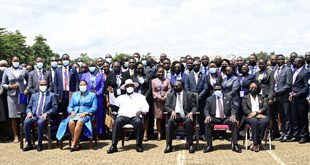
Gulu, Uganda | THE INDEPENDENT | More than 15 families with children living with albinism in Gulu have decried continuous stigma and limited access to healthcare for the non-contagious genetically inherited condition. Albinism mainly results from the complete or partial absence of melanin pigmentation in the hair, skin and eyes.
Parents say that children with the condition in parts of northern Uganda are suffering from marginalization, longstanding stigma and social exclusion from within their families and communities. Based on their skin colour, they are feared, held with suspicion and believed to have supernatural powers.
Over the years, some traditional healers have been accused of fueling attacks on Albinos by demanding their body parts for use in rituals. Many have believed that the hair, bones, genitals and thumbs of people with albinism possess distinct powers to bring wealth and success. To others, raising an albino is a curse.
Hellen Akech, a resident of Gulu East Division and a single mother of eight children, two of whom are albinos told URN that she was forced to quit her marriage after her husband threatened to trade the albino children in Kenya. Akech adds that the two teenage albino children aged 15 and 16 have all dropped out of school due to stigma.
Aketch’s experience is not unique to her. Many other parents say that their children have dropped out of school and continue to endure name-calling and live insecure lives as a result of erroneous beliefs against them.
“Recently, in some countries, they have been branded “Corona” or “COVID-19” in an attempt to scapegoat them for the pandemic,” shows a write up shared by the United Nations, at recent celebrations for the International Albinism Awareness Day.
Florence Anena, another resident of Gulu East Division said she lost her husband just five months after giving birth to her albino son in 1994. She narrates that she has faced endless stigma while raising her son.
“I got frustrated raising my son since the father had died. One day while I was vending fish, one man told me that if it were him, he would tie the boy’s legs and dump him in the forest,” Anena recalls.
Now aged 26, Jonathan Lukwiya, a second-year student of Development Studies at Gulu University equally shares how stigma and limited access to healthcare services remains a huge challenge for his condition.
Medical research indicates that all people with albinism are prone to developing skin cancer, involuntary eye movements and severe visual impairment due to exposure to the sun. As a result, they need to have regular health checks, sunscreen, sunglasses and sun-protective clothing, which are not accessible to many of those living in Northern Uganda despite the harsh weather conditions.
Many of the other families with albino children say that they cannot easily afford the cost of sunscreen. Currently, sunscreen lotions costs between 70,000 to 100,000 Shillings, a cost considered too high for an average household in the region.
Pat Robert Larubi, the volunteer spokesperson of the Source of the Nile Union of Persons Living with Albinism- SNUPA urged the government to consider the plights of the people with albinism by addressing their human rights needs in a manner envisioned by the sustainable development goals.
The 17 goals are the blueprint interconnected to leave no one behind in a drive to achieve a better and more sustainable future for all.
******
URN
 The Independent Uganda: You get the Truth we Pay the Price
The Independent Uganda: You get the Truth we Pay the Price


